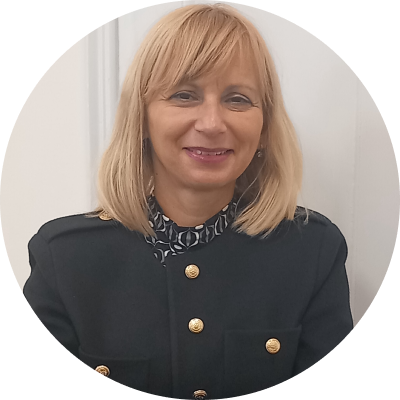november 30, 2023
Speakers

Olivera Nastić
Olivera Nastić was born in 1972 in Belgrade, where she graduated from the Philological High School. She graduated from the Faculty of Education in Sombor in 2013 with a degree in school librarianship, and in 2015 with a degree in librarian-informatics. She completed her Master's degree in Librarian-Informatics in 2019 and is currently in her final year of Doctoral studies in librarianship at the same faculty.
She worked in the Art Documentation Department of the Museum of Contemporary Art in Belgrade from October 1998 to May 2017. She participated in the creation of a large number of biographies and bibliographies of artists in the catalogs of individual and group exhibitions, published by the Museum. Since May 2017, she has been employed at the Belgrade City Library as a subject analyst in the Department for Procurement and Processing of Publications.
She has been a member of the Serbian Museum Association and Serbian Library Association since 2007, and since the same year, he has been the president of the Section of Museum Librarians of the Serbian Museum Association. As president of the section during her twelve-year mandate, she organized several seminars and lectures in various areas of librarianship and informatics in Belgrade, Novi Sad, Subotica, Zlatibor, Kraljevo, Inđija and Zagreb. She actively participated in the work of several commissions and working groups, as well as in a large number of professional and scientific seminars and conferences. Member of the SLA Board for the term 2019-2023.

Hannes Lowagie
Hannes Lowagie is head of the catalographic section in KBR. He is currently working on the transition to RDA, Linked Open Data and the use of AI-technologies in the cataloguing process. He is member of EURIG, RSC Official Language group and the RDA-commissie for the Dutch-speaking part. He has a PhD in Medieval History (University of Ghent, 2012).

Knut Skansen
Knut Skansen is originally from the town of Drammen, but now resides in Oslo, the capital of Norway. Skansen holds a Master of French philosophy and literature from the University of Oslo. From 2001 to 2009, Skansen was General Manager of one of the oldest hotels in Oslo – Hotel Bondeheimen, known as the hub of writers, artists and politicians from all over the country when coming to Oslo. In 2009, he joined Deichman, Oslo’s network of public libraries, as Project Manager for the city’s new main library. Skansen filled the position of Interim Library Director for Deichman from 2016 until 2018. Since 2018, he has served as Library Director for Deichman. On June 28, 2020, the city of Oslo opened its new main library, Deichman Bjørvika. The Deichman network currently consists of 22 libraries. From January 2024 he will leave the position as library director and fill the position as CEO of the Oslo Philharmonic Orchestra (https://ofo.no/no/).

Anna Istók
Anna Istók is the deputy director of the Municipal Library and Information Centre of Gödöllő, and from 2023 she holds office as the general secretary of the Association of Hungarian Librarians. In addition to her economics degree, she obtained his IT librarian qualification, and now she is specialized in library marketing and quality management. Under her control the Municipal Library of Gödöllő was the first city institution in Hungary to receive the distinguished title and prize in the Hungarian library certification system, and since then it has regularly competed in domestic marketing and innovation competitions. She is the author of numerous articles, a regular speaker at professional conferences, and teaches library marketing and quality management at training courses.

Ruth Rikowski
Leading on from Ruth's professional library experience; her published writing on digitisation, knowledge management, globalisation and libraries; and working in the library/IT field (implementing and upgrading library computer systems), Ruth now considers the relationship between AI and libraries. She is also the Series Editor for the Chandos Information Professional Series. When working as a librarian/information professional she worked in public libraries, a library software company, a further and higher education college, the Civil Service, the Tate Gallery London, and an international law company. She later taught and lectured at two universities - London South Bank University and the University of Greenwich.

Hélène Brousseau
Hélène Brousseau, is the Digital Media and Visual Resources Librarian at Concordia University in Montreal, Canada, subject librarian for Cinema, Contemporary Dance, and Music programs. Her experience, including roles at Vtape, a non-profit video art distribution organization where she serves as a board member, and the Artexte Information Centre in Montreal, where she worked as the Digital Collection and Systems Librarian as well as Interim Director, reflects her deep engagement in addressing challenges and advancements related to open access in the arts, research creation, and the dynamic landscape of participatory digital culture.

Andreas Bonde Hansen
Andreas Bonde Hansen holds a PhD in heritage studies and has a long portfolio as researcher, analyst and developer for cultural institutions of international level. Andreas has been working with strategic cultural institutional development from the Arctic to West Africa. For the past couple of years Andreas attention has turned increasingly towards libraries. In this regard, Andreas has done major research reviews on online book consumption trends, and assisted libraries in their cultural Experience Impact development.

Nicklas Hilding Andersen
Nicklas Hilding Andersen is Chief Advisor at Seismonaut. He is working with the impact and value of cultural experiences. He believes there is a need to change how we measure and view our world if we want to create positive change. Through diverse projects within the cultural sector, he has been part of pioneering a method for capturing, analysing and communicating the impact of human experiences – the Experience Impact Compass. He has investigated and analysed the impact of public libraries, performing arts, fine arts, cultural heritage museums, digital games, feature films, documentaries and dramas.